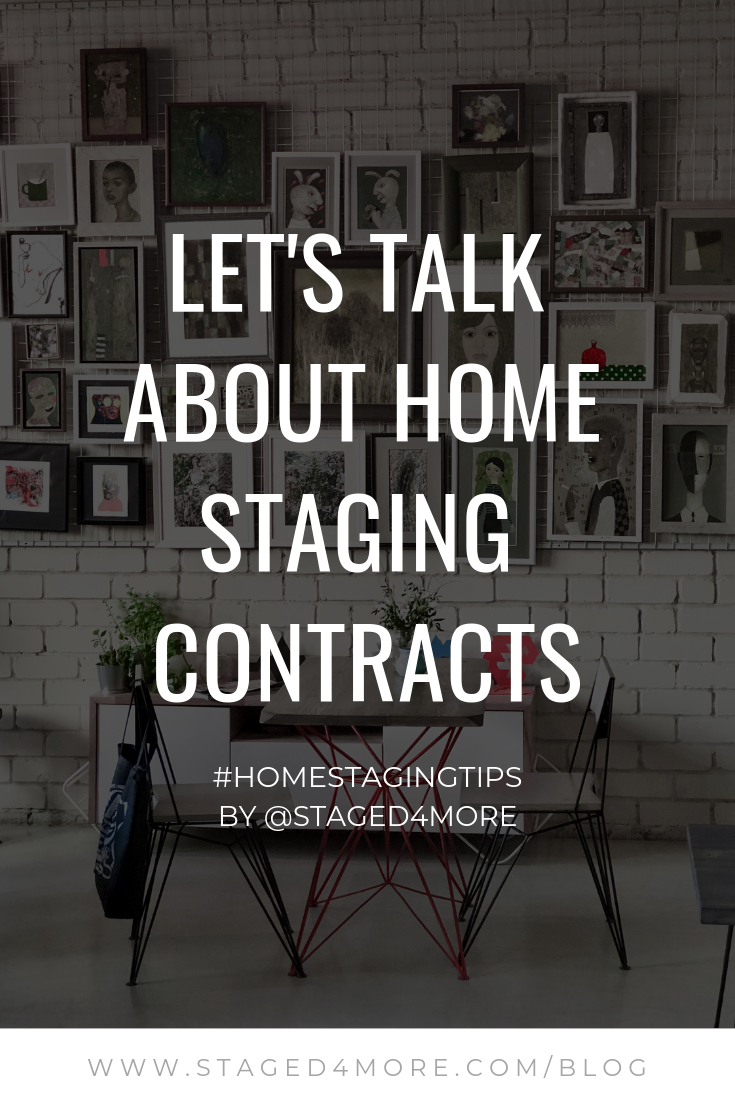Home Staging Contracts: 3 Ways to Protect Your Staging Business
Hey there!
I'm Cindy
Founder of Staged4more.

Home staging contracts or work agreements aren’t very sexy to discuss, but are crucial to have in your business. I get asked a lot about how to make sure staging clients pay on time, what happens if XYZ, etc., but, ultimately, it’s your home staging contract that should cover all your bases and ensure you are well-protected.
I want to preface this post by saying that I am not a lawyer; you should be getting legal advice specific to your situation from a lawyer. What I am sharing here comes from my personal experiences. It is up to you to double-check it with a lawyer. The regulations in each state are also different, so check with your local small business attorney when you have questions.
There are many sample contracts you can download from the internet, but you should still walk through it with a lawyer to tailor it to your home staging business. Your business is your livelihood, so you best make sure you are covered. In addition, you are working with large-ticket items here — a house is not a pair of socks from Target. Liability is much higher than in a lot of other businesses. So it is important to make sure you have a clear home staging contract that protects your livelihood and business.
I view a staging contract as a communication tool between you and your clients. A good home staging contract outlines:
-
the scope of the work that you will perform,
-
what your fee includes, and
-
how you work (payment terms, professional policies, insurance, photography waivers, etc.)
Think of your contract as a raincoat. There may be loopholes, and you may get wet, but it will protect you from most of the crap that’s going to rain on you.
Here are my top three tips on exactly how to use a home staging contract to protect yourself and your business:
1. GET A SIGNED CONTRACT BACK BEFORE STAGING STARTS
I’ve been single for a long time, and I found that before anyone gets a date, I have all the power. It’s the same with staging client relationships. You have something the client wants: the ability to stage their property on time, by a certain date. Before you stage a house, you have all the power. After you stage a house, you lose that power. Once you finish a home staging project, it will be near impossible to get a staging contract signed, and you may spend most of your time chasing after that payment.
We learned this the hard way last year in our business when we got crazy busy. Now, no jobs go on the work calendar unless and until we had received both a signed staging agreement and deposit payment. Our Project Coordinator is very firm about this.
No signature, no payment, no job.
We haven’t had issues since implementing this simple process.
2. THE BEST CRISIS MANAGEMENT TECHNIQUE IS TO PREVENT THE CRISIS
In my years of business, I found that one of the best ways to resolve most issues is to be preventative. For example, even though we say in our staging contracts that it is the client’s responsibility to notify us for destaging, and that the client is responsible for prop rental until the day of removal, we still remind clients before they approach their deadline.
We like to give our clients the benefit of the doubt.
Often, they may get too busy and simply forgot all about it. Selling a home tends to be a hectic time of life! By having a reminder — a 30-second email that you’ve copied and pasted from a template — may save you hours of going back and forth for what clients see as an unpleasant surprise. This is something we have set up in our project management program 17hats, and it helps to prevent any miscommunication.
3. USE YOUR STAGING CONTRACT TO PROTECT AGAINST LATE PAYMENT (OR CLIENTS THAT GHOST YOU)
While you resist the urge to scream at the client “F*ck you, pay me” Ray Liotta-Goodfellas-style, update your invoice and send them a professional email and either:
-
Tack on the late fee, offer to remove it for prompt payment by a specific date.
-
Check in to see if there is a technical issue for submitting the payment (we only take credit cards) and offer to help before adding late fees to the invoice.
Almost every time, the client has simply forgotten. However, if you run into issues with getting people to pay, make sure your contract covers details for all the scenarios possible. When the worst case scenarios happen, you can protect yourself with the signed staging contract and all the documentation of client communication you have. Here are some examples of potential issues that you should address in your contract:
-
Inventory was damaged, missing, or stolen
-
Payment terms: before work starts, recurring billing, late payment, canceled check/bounced credit cards, your deposit policy (refundable or not, how much deposit before work starts), how you take payment
-
Terminating the work
-
Consent & waivers
-
Final invoices
-
What happens when there is a dispute
Having a strong home staging contract is a critical piece of protecting you and your business. It is an essential communication piece between you and your staging client, and it shouldn’t be overlooked.
I interviewed small business attorney Allie Moore, who is also our legal contributor on our 5-Figure Floor Plan home staging business foundation course, on our podcast. You can listen to her home staging contracts and legal tips podcast episode here.
SHARE! WHAT ARE SOME PARTS OF YOUR CONTRACT THAT YOU HAVE CONCERNS WITH? TELL ME IN THE COMMENT SECTION!
Leave a Reply Cancel reply
What Are You Looking For?
Company
About
Join the School
Events
Podcast
Home Stager Directory
International Home Staging Awards
StagerCon 2023
Subscribe to our newsletter
Contact
Student Log-In
Teach on Staged4more
Terms & Privacy Policy
Affiliate Disclosure
Contribute & Ads
Sponsorship
Join Us
FAQs
Become an Ambassador
Contact
Website Design by Local Creative
© 2024 Staged4more. All Rights Reserved



Starting a home staging business would love to see an example of a good contract
Hi Michelle,
Thanks for reaching out and showing interest in a contract template for home staging. It’s super important to have a solid contract in place, and I’m glad you’re looking to set things up properly.
We’ve got a contract template that could be just what you need. It’s part of our 5-Figure Floor Plan business foundation course. Not only does the course include a contract template developed by our attorney contributor who knows the ins and outs of home staging business law, but it also offers a video walkthrough of the entire contract. In the video, our attorney contributor covers all the critical points of the contract, highlighting what you should and shouldn’t do and explaining why each section is important. We also did a focus group with working stagers when working on this particular module.
This course is designed to give you a robust foundation for your business, complete with the tools and knowledge to protect your hard work. If this sounds like something that could help you level up your home staging game, you can find more info about the course on our site here.
Hope this helps, and if you’ve got any more questions, feel free to drop them here.
Cheers,
Cindy